‘There is no feeling like being free’
Anthony Ray Hinton’s words kept a capacity crowd of more than 1,700 in Furman’s McAlister Auditorium spellbound for more than an hour Wednesday night. His words failed him, however, when he was asked earlier in the day about walking out of an Alabama prison in 2015 after nearly three decades on death row.
“There is no feeling like being free,” Hinton said after a pause. “I spent 30 years in a 5-by-7-foot cell. You cannot find the words to say how it felt.”
Hinton was clear, however, about the anger he feels toward a criminal justice system that convicted and sentenced him to death for a pair of 1985 murders he didn’t commit.
“We have a justice system that is badly flawed. Any time we send innocent men and women not just to prison but to death row, I think we all should be concerned about that,” he said. “I don’t want to see no one in any state go through what I went through simply because we have a corrupt system, and the only way that I feel we’re going to change it is with my story and other stories being told.”
Hinton uses the word corrupt because he believes something far more nefarious than a mistake or incompetence took his freedom and nearly his life. In his book, “The Sun Does Shine: How I Found Life and Freedom on Death Row,” Hinton, who is African-American, places the blame squarely on racism.

Anthony Ray Hinton shakes hands with Furman Provost George Shields, his partner Coco Harris and his daughter Grace, Wednesday after his talk at McAlister Auditorium. Dozens of people lined up to get autographed copies of his book, “The Sun Does Shine: How I Found Life and Freedom on Death Row.”
“We need to stop believing that we have the best judicial system in the world,” Hinton said. “Perhaps for some it’s the best judicial system in the world, but when you are a person of color it’s not the best judicial system in the world.”
The white police officers who arrested Hinton assured him he’d be convicted whether or not he was guilty because of his race, Hinton said, and prosecutor Bob Gregory, who wrote in his own book he could tell Hinton was guilty and “evil” by the way he looked, had a documented history of racial bias.
The Equal Justice Initiative, an organization committed to ending mass incarceration and challenging racial injustice in the United States, eventually took up Hinton’s case. And after years of fighting, the U.S. Supreme Court reversed the conviction on the grounds that Hinton’s trial lawyer did not provide adequate representation required by the U.S. Constitution. An Alabama judge dismissed the charges during the retrial after prosecutors admitted that their own ballistics tests couldn’t match the bullets used in the murders to Hinton’s mother’s gun, which was the only physical evidence ever produced by the state.
Hinton was released on April 3, 2015, 13 years after his mother had died and so cut off from the outside world that he thought the voice coming from a GPS was an actual person hidden somewhere in the car.
“I cried like a baby,” he said. “I did my interviews, and my best friend (Lester Bailey, who visited him in prison weekly) asked where I wanted to go first. I said ‘take me to where they laid my mother’s body.’”
Hinton admits he was consumed by bitterness and anger after his conviction, claiming he didn’t speak to anyone for his first three years on death row and wondering why God had allowed this to happen. It took the weeping of a prisoner in the cell next door one night to allow Hinton to live again.
“I asked this man what was wrong, and he told me he had got word his mother had passed,” Hinton said. “And as I sat on my bunk I realized my mother was still alive and I had something to be thankful for.”
He remembered looking in the mirror and seeing someone he wasn’t used to seeing.
“I am person who believes in laughter,” he said. “I wasn’t laughing anymore. I decided I would get my life back regardless of where it was.”
Hinton started a book club in death row while befriending 54 people who would eventually be executed during his time there. One was notorious Ku Klux Klan member Henry Francis Hays, who was waiting to be put to death for the lynching of Michael Donald, a 19-year-old black man, in 1981.
Hays didn’t tell Hinton who he was, and when Hinton finally found out the reaction wasn’t what you might expect.
“All his life he was taught hate, and I felt bad for him that this mother and father didn’t love him enough to show him love,” Hinton said. “I thought, I have enough love given to me by my mom that I really believe I could give to the whole world. I just started talking to him and started trying to deprogram him to show him that I’m no different than you are.”
The two became friends, and, in his final moments before being was executed in 1997, Hinton says Hays thanked “the very people they taught me to hate.” That message of redemption, empathy and unity is a theme of Hinton’s book and was the theme of his talk at Furman.
“I never thought about writing a book … but after hearing so many people telling me to write it, I went to my attorney Bryan Stevenson (founder and executive director of EJI) and asked, ‘How hard would it be for me to write a book?’” Hinton said. “He said, ‘All you’ve got to do is say you want to do it, and I’ll help you.’ It wasn’t so much about me. The focus was to help others realize that there lies within all of us humanity and compassion. I wrote this book hoping it would change peoples’ hearts.”
Hinton has been interviewed by national and international media outlets since his book was published in 2018, even appearing on “CBS This Morning”with Oprah Winfrey when she announced it as her latest Oprah’s Book Club selection. But the attention isn’t what gives Hinton the most satisfaction.

Anthony Ray Hinton, left, poses with Jonathan Kubakundimana ’16 outside McAlister Auditorium before Hinton’s talk Wednesday. Kubakundimana is a program assistant with the the Equal Justice Initiative, the organization that fought for years to get Hinton’s conviction overturned.
“It makes me feel good that people come up to me every day somewhere and say, ‘Mr. Hinton, I just want to shake your hand and say thank you. That book is one of the most powerful books I have ever read. It changed the way I thought,’” Hinton said. “I get letters from white Americans, and they’ll say ‘Mr. Hinton, I was born white and privileged, and I never have used my privilege the way that I should have. After reading your book, I promise you I’m going to use it the way I think I should use it.’ That makes me feel wonderful.”
Hinton signed copies after his talk in McAlister, which was sponsored by the Furman University NAACP, Furman University Religious Council, Furman University Poverty Awareness Committee, Furman University Diversity Council and St. Joseph’s Catholic School. The event was organized by the Riley Institute at Furman’s Advance Team, a select group of Furman students who act as ambassadors for Furman and the Riley Institute.
Following Hinton’s remarks, Jonathan Kubakundimana ’16, who works as an EJI associate, discussed the institute’s work advancing criminal justice reform.
“I won’t lie to you: I wake up every morning, and I wonder what it is that makes us dislike one another, what it is to make us be racists,” Hinton said. “Death row is the only place that I ever been that I didn’t experience any racism … I hate that I think people look at me and they judge me for my color.”
Learn more about the Equal Justice Initiative here. Copies of Hinton’s book are available for sale in the Furman University bookstore.